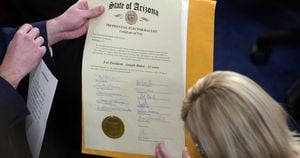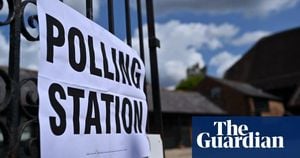On the evening of December 3, South Korea found itself at the center of an unexpected political upheaval as President Yoon Suk-yeol declared emergency martial law during a late-night televised address. The declaration, which aimed to safeguard the nation from perceived threats, has left citizens shocked and uncertain about the future of their democratic processes. Yoon, referring to both North Korea and the domestic opposition, framed the imposition of martial law as a necessary action to maintain order and stability amid rising tensions between his government and opposition parties.
President Yoon's announcement came on the heels of increasing political friction, especially concerning the opposition's attempts to block significant budgetary measures. During his speech, Yoon stressed, "The integrity of our constitutional order is under threat from anti-state activities and those undermining our democracy." He cited actions from the National Assembly and opposition lawmakers as detrimental to public safety, asserting their attempts to cut funding for national operations jeopardized the safety and well-being of South Korea.
This bold move saw the President targeting the opposition-controlled National Assembly, accusing it of effectively paralyzing the government. "Our ability to function and maintain law and order has been compromised by efforts to destabilize our government," Yoon explained, underscoring the urgency of his measures.
Within hours of the martial law declaration, the political arena shifted dramatically as lawmakers quickly took action against the President's decision. Members of parliament voted overwhelmingly to denounce Yoon's declaration, demanding its immediate lift. The head of the ruling People Power Party, Han Dong-hoon, was particularly vocal, calling Yoon’s decree "wrong" and indicative of overreach, aligning himself with the voices of dissent growing among the population.
Compounding the situation, the opposition Democratic Party, led by Lee Jae-myung, condemned the move as authoritarian and potentially perilous for the nation’s economy. Lee declared, "This declaration is not just about order; it signals our descent toward dictatorship. The ramifications could be severe both economically and politically." The Democratic Party planned to convene emergency meetings to address the ramifications of the declaration and strategize their response, emphasizing the need for democratic integrity.
The atmosphere was charged with fear and uncertainty as citizens braced themselves for the restrictions martial law would inevitably impose. Under the decree, political activities were effectively suspended; all legislative functions at local and national levels ceased, and public gatherings such as protests and strikes faced increased scrutiny and punishment. Media outlets were warned of stringent government oversight, and any attempts to disseminate information perceived as damaging to the state could lead to harsh penalties.
President Yoon's tenure, which began amid high hopes for leading South Korea through contemporary challenges, has faced hurdles since its inception. His approval ratings have dwindled, plagued by controversies and scandals, not least of which involve allegations surrounding members of his administration and personal ties. Many observers now see the martial law declaration as Yoon maneuvering desperately to regain control over the narrative and authority of his presidency.
Public response to the martial law declaration was swift and predominantly negative. Across major cities, protests erupted, as citizens rallied against the authoritarian measures. Images of demonstrators filling the streets reflected the palpable tension within the nation. Many were adamant about preserving their democratic freedoms, with signs condemning both martial law and Yoon’s leadership.
Experts and commentators weighed the potential reactions from North Korea. While Yoon characterized the situation as being exacerbated by communist influences from the North, analysts suggested the North Korean leadership would likely observe the chaos with mixed feelings. Some predicted North Korea might utilize the turmoil to validate its own oppressive regime, releasing statements to depict Yoon's administration as unstable. Victor Cha, the Korea Chair at the Center for Strategic and International Studies, noted, "North Korea is likely to exploit this chaos for propaganda, asserting it as evidence of South Korea's failing democracy."
Other analysts, such as Bruce Klingner from the Heritage Foundation, expressed skepticism over any immediate military response from North Korea, preferring to view the situation through the lens of rhetorical retaliation rather than outright action. He stated, "While rhetoric may escalate, actual military provocation may not be forthcoming. North Korea tends to play the long game, waiting for the right moment to strike politically or militarily without acknowledgment of its involvement."
The tumultuous circumstances surrounding the martial law decree have raised substantive questions about the future of South Korea's political fabric. Many are left grappling with the possibility of enduring hardships under martial law and how the opposition and civil society will navigate this unprecedented declaration.
Understandably, sentiments among the citizenry are mixed, ranging from fear to outrage to defiance. Activists and representatives from various social movements are strategizing ways to confront the martial law and return the country to normalcy. Harted sentiments directed at President Yoon have crystallized around demands for transparency, accountability, and the restoration of democratic processes.
Looking forward, the political climate remains tenuous. Should the situation continue to deteriorate, it could lead to broader calls for Yoon's resignation or even impeachment, echoing the atmosphere surrounding prior political scandals involving government leaders. The next steps taken by both the government and the opposition will be closely monitored, not only by South Koreans but also by the international community.
While Yoon insists his measures stem from necessity, the swift backlash from within parliament and society showcases the precarious balancing act facing his government. If martial law persists, predictions of political instability and widespread unrest remain strong. South Korea, which has long held itself as a bastion of democracy, now faces deep-rooted challenges as it navigates the realities of governance under martial law and public unrest. The next moves from both the ruling party and the opposition will dictate not only the immediate political environment but also the future shape of South Korea as it attempts to emerge from the specter of authoritarianism.



